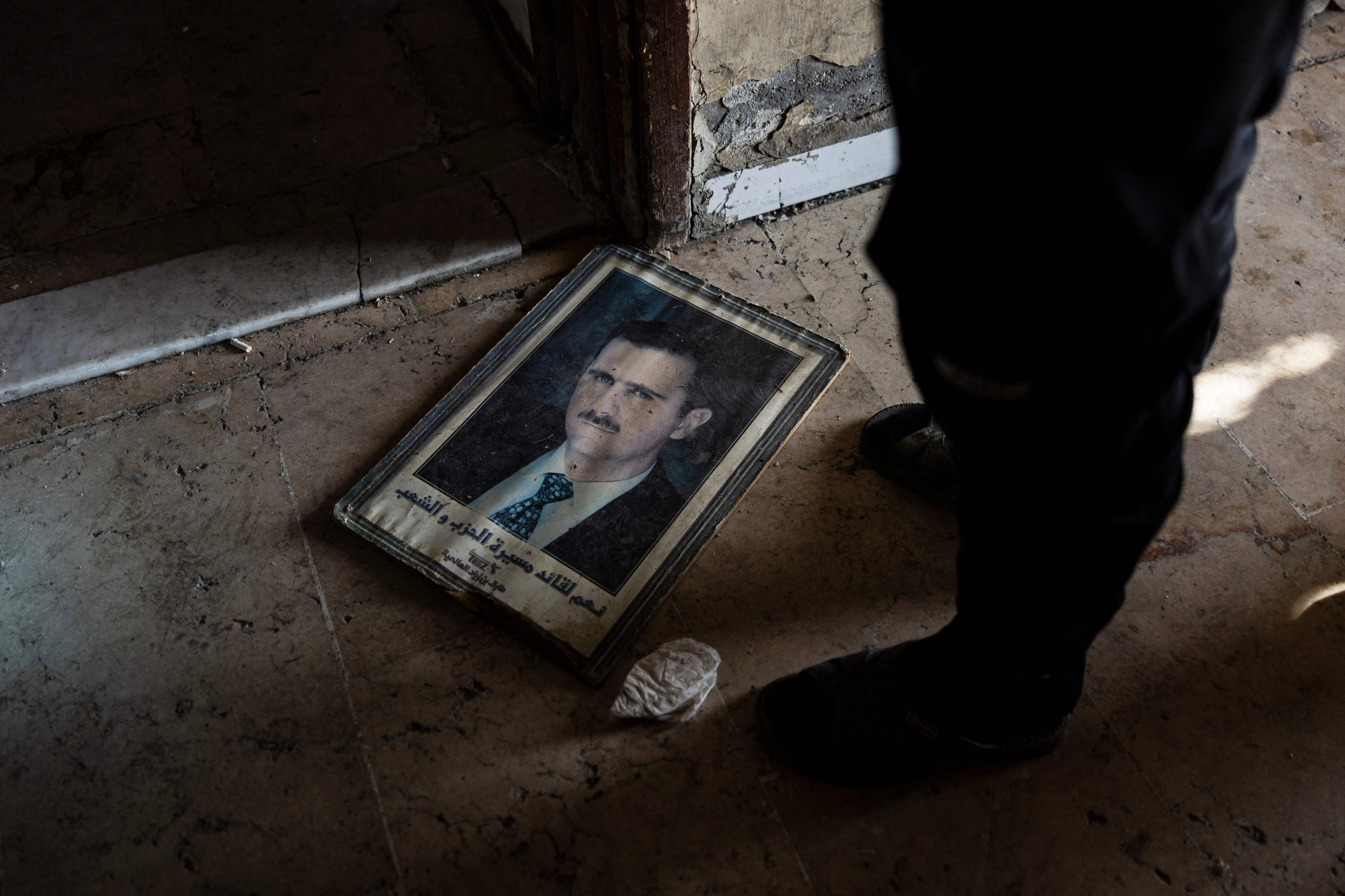© Turkuvaz Haberleşme ve Yayıncılık 2025
From Israel's ongoing genocide in Gaza and the fall of Syrian long-time dictator Bashar Assad to Russia's war on Ukraine and Donald Trump's U.S. presidential election win, all dominated headlines in 2024, capping another year marked by conflicts, global political chaos and humanitarian crisis.
The already volatile Middle East saw the flame of war spread across multiple countries, fanned further by Israeli acts of violence with impunity.
After the unprecedented Hamas incursion on Oct. 7, 2023, Israel unleashed a genocide in Gaza and extended its campaign into Lebanon.
In Gaza alone, Israel has killed more than 45,500 people, mostly women and children, according to the Health Ministry there. The Palestinian territory has been plunged into a humanitarian disaster.
In September Israel launched a huge airstrike against Iran-backed Hamas ally Hezbollah, then a ground offensive in southern Lebanon against its strongholds.
In early October Iran then responded to the Israeli assassination of Hamas chief Ismail Haniyeh – in a strike on Tehran in July blamed on Israel – and Hezbollah chief Hassan Nasrallah, by launching 200 missiles at Israel. Israel riposted by hitting Iranian military sites.
After two months of open war, a fragile truce came into force on Nov. 27 in Lebanon.
The war has killed at least 4,000 people in Lebanon since October 2023, according to the Health Ministry.
In Syria, Bashar Assad fled the country to Moscow after an 11-day lightning offensive launched on November 27 by the anti-regime group, Hayat Tahrir al-Sham (HTS).
One of the emblematic moments of the fall of Damascus was the freeing of inmates from the infamous Sednaya prison.

That jail north of the capital was a symbol of the torture and executions under the 50-year rule of the Assad clan, especially since the Syrian civil war erupted in 2011.
The country's interim government has sought to reassure minorities at home and governments abroad that they will protect all Syrians.
Since Assad's ousting Israel has conducted hundreds of strikes on Syria's military sites, wanting to prevent the country's weapons from falling into the hands of the interim government. It has also seized the U.N.-patrolled buffer zone on the Golan Heights.
After a failed counteroffensive in 2023, following Russia's Feb. 24, 2022 invasion, Ukraine in August launched a surprise incursion into Russia's Kursk region.
However, it has failed in its goal of diverting Moscow's forces from fighting in eastern Ukraine.
Russia responded with deadly strikes and Kyiv's outgunned and outmanned troops have struggled to hold back steady advances from Russian forces, notably in the eastern Donbass region.
The West, Ukraine and South Korea say thousands of North Korean soldiers are reinforcing Russia's war effort.
In November Ukraine for the first time used Western-supplied long-range missiles against Russian territory, after getting U.S. and British clearance.
Russia responded by hitting Ukraine with a hypersonic Oreshnik missile without a nuclear warhead, vowing to continue such attacks if Kyiv continued its attacks with Western weapons.
President Vladimir Putin has also threatened to attack countries providing the weapons to the Ukrainians.
In late November Russia launched a massive attack on Ukraine's energy infrastructure.
In recent weeks it has intensified strikes on southern Ukraine, reinforcing fears of a new Russian offensive in the area.

Donald Trump once again stunned the world, and wrong-footed pollsters who had projected a very tight race, to win the U.S. presidential election.
He won all seven swing states on Nov. 5, keeping control of the House and winning back the Senate. He also became the first Republican president in 20 years to win the popular vote.
He beat his Democrat rival Kamala Harris, who had been parachuted into the process just 100 days before the election after the 81-year-old outgoing President Joe Biden pulled out.
That was just one twist in a particularly tumultuous campaign that also included two failed assassination attempts on Trump, 78, who faced four indictments and a criminal conviction.
He returns to the White House on Jan. 20, 2025. Among the personalities he has chosen for his team is billionaire Elon Musk, who helped finance his campaign.
In 2024 social media titans faced growing scrutiny.
In France in August, the Russian-born founder of the controversial Telegram app, Pavel Durov, was arrested and charged with failing to curb extremist and illegal content on his network, which has 900 million users.
In August, U.S. billionaire Musk's X, formerly Twitter, was banned for 40 days in Brazil – its largest Latin American market – in a legal tussle over disinformation.
Supreme Court judge Alexandre de Moraes branded X a danger to democracy.
The platform became available again in October after it agreed to pay some $5.2 million in fines for flouting court decisions.
Another heavyweight platform, TikTok, was ordered by the United States to divest from Bytedance, its Chinese owner, by Jan. 19 or be banned.
The Supreme Court will first examine the constitutionality of the law, which was backed by Joe Biden.
The EU is investigating TikTok following allegations it was used by Russia to sway the result of Romania's later annulled presidential election first round, won by the far-right's candidate Calin Georgescu.
Temperature records continued to tumble in 2024 across huge swathes of the world during what will almost certainly be the hottest year on record.

Relentless global warming provoked heatwaves, droughts and deadly flooding, with the wet weather proving particularly dramatic.
An unusually intense rainy season in West and Central Africa killed more than 1,500 people, according to the International Organization of Migration (IOM).
In a September of wild weather, Hurricane Helene pounded the southeast United States, Typhoon Krathon slammed into Taiwan and Storm Boris brought floods and devastation to central Europe.
Typhoons Yagi and Bebinca left a trail of destruction in Asia.
And in October a devastating Mediterranean storm lashed eastern Spain, triggering its worst floods in decades that killed more than 230 people.
In December Cyclone Chido devastated the French overseas territory of Mayotte.
In Senegal, Bassirou Diomaye Faye became the youngest president since independence in 1960, elected in March at the age of 44 on the promise of radical change in a country where three-quarters of the population is under 35.
In Kenya in June, a protest movement by demonstrators in their 20s forced President William Ruto to withdraw an unpopular budget proposal and reshuffle his government.
Young people were also the drivers of change in Botswana, playing a key role in the historic electoral victory in October of the opposition against a party that had ruled since independence nearly six decades ago.
European elections in June confirmed nationalist and far-right parties rising in France, Germany, Belgium, Austria, Italy and the Netherlands.
This also translated at the national level.
Austria's far-right Freedom Party won a historic victory in legislative elections.
In France, a republican bloc prevented the far-right National Rally from coming to power in snap parliamentary elections, but the absence of a clear majority has unleashed a political crisis.
The Alternative for Germany (AfD) won a regional election for the first time and achieved historically high scores in two others.
And meanwhile in England and Northern Ireland dozens of towns were rocked by anti-immigration riots fuelled by far-right agitators.
